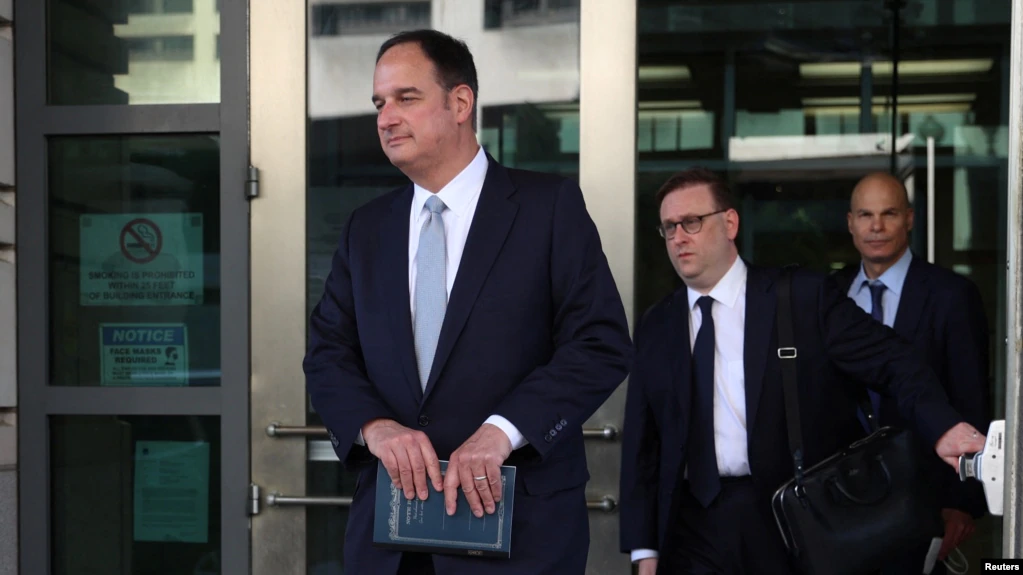Key witness testified against Hillary Clinton campaign lawyer
The chief prosecution witness at the trial of Hillary Clinton’s campaign lawyer testified Thursday, saying he was “one hundred percent sure” that the lawyer who provided information that was intended to raise suspicions about Donald Trump’s possible ties to Russia told the witness that he was “not acting on behalf of a particular client.”
Lawyer Michael Sussmann is accused of falsely testifying to the FBI that he represented the Clinton campaign in 2016 and another client, though Clinton’s staff claims that Sussmann was not allowed to meet with FBI agents. The case is part of an ongoing special prosecutorial investigation into the origins of Trump’s “Russia affair.”
Sussmann’s attorneys deny that he lied in his conversations with federal agents. On Thursday, his defense attorneys tried to refute the testimony of key witness James Baker, suggesting that his recollection of a September 2016 meeting with Sussmann was “vague” and that his testimony changed over time.
Baker was general counsel for the FBI in September 2016, when his friend Sussmann, who did legal work for the Clinton campaign staff, scheduled a meeting to give Baker information that Sussmann said pointed to a potential secret link between a Russian bank and the Trump Organization, owned by Donald Trump.
Sussmann is accused of lying to Baker during that meeting, saying that he provided the FBI with data not on behalf of a specific client. In fact, prosecutors say, during that meeting, he represented Clinton’s campaign staff and another client, a technology executive, who gave him compromising information about Trump.
Prosecutors argue that Sussmann did not disclose his ties to the Clinton campaign because he thought the FBI would find the information less credible if it took into account the source’s possible bias.
The charges against Sussmann were brought by Special Prosecutor John Durham, appointed as special counsel to the Trump administration to investigate wrongdoing by government officials in the early days of the investigation into Russian interference in the election and Moscow’s potential ties to the Trump campaign.
An acquittal could provoke criticism about the true purposes of Durham’s investigation, and a guilty verdict would likely inspire Trump supporters who have long counted on Durham to show bias against the former president.
Defense attorneys deny that Sussmann lied. Speaking to the jury, they said it was impossible to be sure exactly what Sussmann said in the meeting with Baker because neither participant took notes.
During cross-examination, Sussmann’s attorney Sean Berkowitz presented Baker with his own previous testimony about the meeting, in which he seemed less certain about exactly what was said, and even in some cases made different definitions compared to the testimony he gave at trial Thursday.
For example, during his congressional testimony in October 2018, Baker was asked if he knew during the meeting that Sussmann was representing Clinton’s campaign staff at the time. He responded, “I don’t remember him specifically saying that at the time.”
Testifying Thursday, Baker said he was “100 percent sure” that Sussmann told him during a Sept. 19, 2016, meeting at FBI headquarters that he was not there on behalf of any of his clients.
“Michael is a friend and colleague of mine, and I believed (that) and believed that statement was true,” he said.
When questioned by prosecutors, Baker said that if Sussmann had told him he was seeking a meeting as a lawyer for the Clinton campaign, he probably would not have agreed to it – in part because Hillary Clinton herself was under investigation in 2016 for her use of a private email server while she was head of the State Department.
While he noted that the FBI always wants reports of criminal wrongdoing or threats to national security, the bureau also takes into account the identity of the person or organization providing the information when assessing the credibility of a report.
“Certainly it would raise very serious questions for me about the credibility of the source, the veracity of the information, and I would have a significant question about whether we were going to be dragged into political games,” Baker said.
During cross-examination later that day, he acknowledged that he was aware that Sussmann and his law firm had represented the Clinton campaign in the hacking of the Democratic National Committee email server by Russian hackers.
The data submitted by Sussmann was supposed to show a covert link between a Russian Alfa Bank server and a Trump Organization server. At the time, the FBI was investigating whether the Kremlin and the Trump campaign headquarters were coordinating to influence the outcome of that November’s presidential election.
Given the existence of that investigation, Baker said, he saw the data as a potential threat to national security and acted quickly, in part because Sussmann told him that the media intended to report it. He warned a senior FBI counterintelligence official, believing it could be another piece of evidence in the investigation into Trump’s Russian ties, and expressed concern that media coverage could force Russia to change its behavior.
“I was already aware that we had this kind of investigation going on, and here was another set of allegations about another aspect of alleged interactions or connections between the Russian government” and the Trump campaign,” Baker said.
Baker noted that he understood from his conversation with Sussmann that the materials suggestive of a channel of communication between a Russian bank and Trump’s campaign were put together by serious and respected cybersecurity experts. However, the FBI quickly determined that there was in fact no contact between Russia and the Trump campaign.
